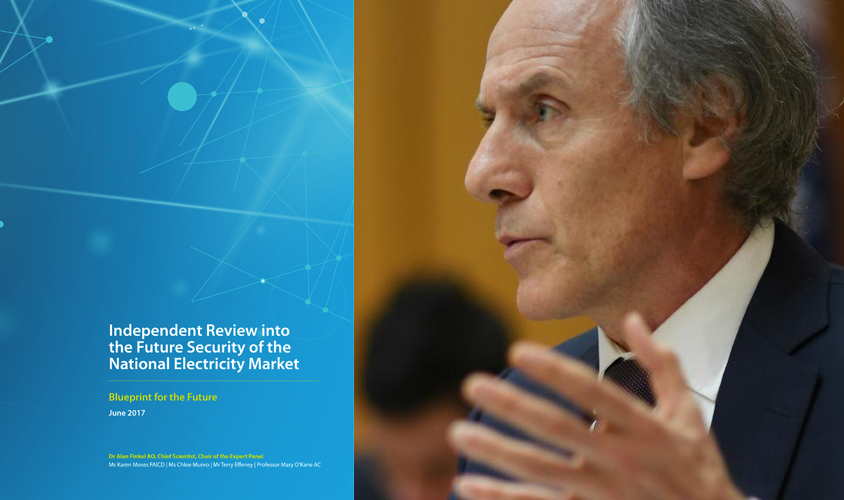As a climate plan it’s second-rate, but it’s our best chance to end the climate wars.

Chief scientist Alan Finkel and his energy report. PHOTO AAP
It can be no surprise that Tony Abbott looks with great suspicion on the review into the security of our electricity supply led by Australia’s Chief Scientist, Alan Finkel (the Finkel Review).
It was Abbott’s unblinking resolve to destroy Australia’s only enacted carbon pricing regime that fired up our climate war. When he succeeded in 2014 we became the only nation in the world to end an established carbon pricing scheme. We still have that unique distinction.
His sensitive political nose is right when it tells him that the energy plan arising out of the Finkel Review will again put a price on carbon in the form of a low-emissions target.
As a pricing scheme it’s a step down the ladder from the emissions intensity scheme which Malcolm Turnbull considered then ditched last December, and it’s a faint echo of the robust carbon pricing scheme Australia briefly put into practice. But it will put a price on emissions.
Finkel’s plan encourages electricity retailers to opt for low-emission electricity, determined by the amount of carbon emitted per megawatt to produce it. Reflecting the government’s aversion to effective targets and measures, the price signal won’t be a strong one. But it’s there.
“The lack of a transparent, credible and enduring emissions reduction mechanism for the electricity sector is now the key threat to system reliability,” says Finkel. So it’s a stable and reliable electricity system – not climate change – that justifies his proposed “Clean Energy Target” (CET).
Australia’s National Energy Market (it actually covers just the eastern states and South Australia) is in the same unholy mess as our emissions measures, for exactly the same reason: partisan politics.
The Finkel plan doesn’t address energy efficiency and adds complexity to an already-complex market administration. But it does address demand issues, and offers a place to start restructuring the market.
On the much bigger issue of climate change, the review does very little. It accepts the government’s emissions target of 28 per cent below 2005 levels by 2030, compared to a European Union target of a 40 per cent cut by 2030 and well below what science considers necessary for a safe climate.
In accepting Australia’s weak target, the scheme accommodates gas and coal generation, even boosting coal’s survivability. Finkel’s modelling shows coal power lasting beyond 2050, later than is currently expected by Australian industry and probably by the coal industry itself.
The justification for this extended lifetime is to lessen the cost of closing coal plants, easing pressure on power prices. Finkel says that the CET will benefit households by about $90 a year.
To stall condemnation from Coalition naysayers like Abbott, Craig Kelly and Eric Abetz, environment minister Josh Frydenberg got on the phone to his colleagues last week reminding them of the favourable treatment handed out to the coal industry.
But it takes a lot to calm these people down. Abbott signalled his intent to go over the Finkel plan with a fine-tooth comb, Abetz accused Finkel of making “creative assumptions”, and Kelly feared the plan would make our energy supply less reliable.
I don’t think that attitude will hold sway among others in the Coalition. Nor do I think deputy PM Barnaby Joyce’s promotion of new “clean” coal-fired power stations is any more than a fantasy. Coal’s prospects grow slimmer as the cost-effectiveness of renewable technologies rises.
None of this is very encouraging, but the Finkel compromise promises something that all the other schemes have patently failed to do: bring a measure of cross-party agreement to the climate debate.
Perhaps as a gesture to the Greens, Labor leader Bill Shorten made his offer of cooperation to the PM seem more like a demand, and his environment spokesman Mark Butler sounded a warning that new coal generation would threaten a deal, but both seem to want an agreement.
On climate policy, Finkel had the task of making a silk purse out of a sow’s ear. The purse may not be silk, but at least it’s a purse. The question to ask is not what it does now, but how it can subsequently be strengthened, and as usual, the only thing holding us back is politics.
